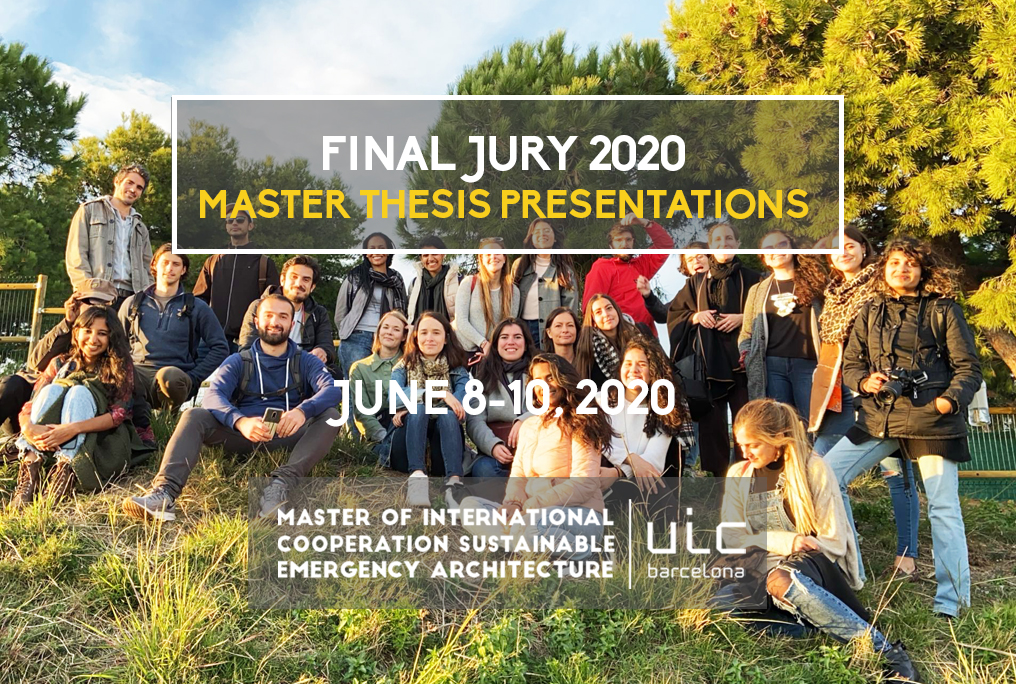 Time has passed quickly and like every year, our course comes to an end with the presentation of our students’ final theses. Due to COVID-19, this year the presentations will be online. From June 8-10, our students will present their work in front of the jury comprised by our in-house faculty members and our guests Nebojša Čamprag and Anshika Suri from TU Darmstadt.
Time has passed quickly and like every year, our course comes to an end with the presentation of our students’ final theses. Due to COVID-19, this year the presentations will be online. From June 8-10, our students will present their work in front of the jury comprised by our in-house faculty members and our guests Nebojša Čamprag and Anshika Suri from TU Darmstadt.
Here’s are the topics of our students’ master theses this year:
- TOWARDS PREVENTATIVE URBAN HEALTH RESILIENCE: A Case Study of Cairo’s Heliopolis (Mohamed Gad Abdelmoneim)
- Assessing Disaster Risk Reduction in Refugee Camp Design: The Case of Al-Wehdat and Azraq Refugee Camps in Jordan (Abdel Rahman Al Zoubi)
- Dynamics Impacting Scholastic Performance at Rural Public Schools in Eastern Cape, South Africa (Susan Bwowe)
- WAITING IN NON-PLACES: The spatialization of discourses in Mexico’s Migrant Integration Centres (Lorenza Esquinca)
- CITY RESPONSE TO ACCESS TO PLAY FOR REFUGEE CHILDREN: The case of Lebanon (Stephanie Abou Chakra)
- INFORMALITY AGAINST MODERNITY: An Analysis of Social and Spatial Impacts from Development-Induced Relocation of the Urban Poor in Addis Ababa (Markos Hughes)
- PERCEPTIONS OF PLACE WITHIN PARADOXES OF INCLUSION AND EXCLUSION The case of Unaccompanied Youth Migrants in Sweden (Maria Manoj)
- MIGRATION STORIES & THE SPACE IN BETWEEN: The construction of the sense of home for Venezuelan migrants in Barcelona (Angelica Romero)
- SUPPORTING SELF-RECOVERY IN POST-CONFLICT SITUATIONS: Insights from Syria (Taylor Raeburn-Gibson)
- MODELS OF SOCIAL AND PHYSICAL INTEGRATION OF REFUGEES: The Experience of Trieste, Italy. (Mario Romano)
- THE EFFECTS OF PARTICIPATION PROCESSES IN COMMUNITY CONSTRUCTION PROJECTS: The Architect ́s role as the facilitator for community empowerment (Adrian Cassar)
- INTEGRATING REFUGEES IN SHRINKING CITIES THROUGH ADAPTIVE REUSE: Architectural Principles for Refugee Housing Projects (Pilar Del Amo)
- DRR and SUSTAINABLE DEVELOPMENT INTEGRATION IN URBAN RESILIENCE STRATEGIES: The Role Model of the Province of Potenza (Valentina Riverso)
- An Evaluation by Humanitarian Practitioners of Owner-Driven Reconstruction in Rural Nepal (Valeria Carrión)
- CAN A DROUGHT TEACH YOU HOW TO ADDRESS WATER EQUITY? Gaining Insight on Cape Town’s Day Zero Crisis(Nadia Francisco)
- CRISES, CAPITAL & THE IMMIGRANT: The Impact of Platform-Delivery Work on the Socio-Spatial Integration of Immigrant Riders in Barcelona (Prachi Metawala)
- Co-producing with Communities: Reflections on the Community-Led Data Collection Model of Slum Dwellers International (Bindhu Bhuma)
- ITINERANT ARCHITECTURE: An International Workshop in Delta del Paraná and New Opportunities for the Co-Creation of Places (Giulia Condulmari)
- TACTICAL URBANISM – AN OPPORTUNITY FOR IMMIGRANTS` SOCIAL-SPATIAL INTEGRATION: The case of Carabanchel District in the City of Madrid. (Óscar Cartagena)
- SOME SOIL BETWEEN THE FINGERS: A Comparative Study of the Conditions and Perceptions of Urban Agriculture in Three Swedish Municipalities (Amanda Larsson)
- Appropriating the West Bank Settlement & Heritage Sites as Spaces of Conflicting History, Memory and Cultural Identities (Alexander Rosenfeld)
- History as a Witness: How Memory Transforms Socio-Spatial Dynamics in Plaça Sant Felip Neri. (Ricardo García)
- MEMORY SPACE AS SYMBOLIC REPAIR IN POST-CONFLICT SITUATIONS: The case of Bojayá (Ixa Bachman)
- THE ROLE OF EDUCATIONAL SPACES IN POST-ETHNIC CONFLICT SITUATIONS: The case of Bosnia and Herzegovina (Flavia Ragnacci)

